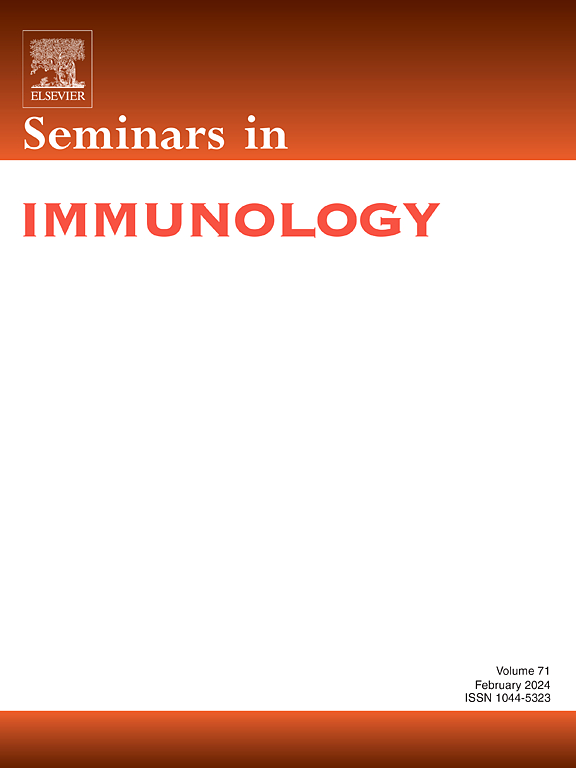Myelin oligodendrocyte glycoprotein antibody-associated disease (MOGAD): Insights into pathogenesis and biomarkers of prognosis
IF 7.8
2区 医学
Q1 IMMUNOLOGY
引用次数: 0
Abstract
MOG antibody-associated disease (MOGAD), an inflammatory demyelinating pathology, is typically associated with the clinical phenotypes acute disseminated encephalomyelitis (ADEM), optic neuritis (ON), or transverse myelitis (TM). The mainstay of diagnosis is detection of antibodies targeting oligodendrocyte-expressed MOG (MOG-IgG). MOG-IgG-mediated demyelination occurs via complement-dependent cytotoxicity (CDC), antibody-dependent cellular cytotoxicity (ADCC), enhanced cognate T-cell CNS infiltration and activation, and oligodendrocyte cytoskeleton disruption, but the exact role of the immune system in MOGAD is still poorly understood. The disease course is either monophasic or relapsing, with relapsing course affecting approximately two-thirds of individuals. Neurological disability accumulates with relapse and may manifest as visual, motor, sensory, and cognitive deficits. Thus, accurate disease course prediction is of paramount importance. Prognostic biomarkers, implemented at a global scale, have the potential to guide timely therapeutic decisions to limit relapse-associated disability accrual while simultaneously avoiding unnecessary immunosuppression in monophasic individuals. This review explores recent insights in the understanding of MOGAD pathogenesis as well as advances in prognostic biomarkers of relapsing course and disease activity.
髓鞘少突胶质细胞糖蛋白抗体相关疾病(MOGAD):发病机制和预后生物标志物的见解
MOG抗体相关疾病(MOGAD)是一种炎症性脱髓鞘病理,通常与临床表型急性播散性脑脊髓炎(ADEM)、视神经炎(ON)或横断性脊髓炎(TM)相关。诊断的主要方法是检测针对少突胶质细胞表达的MOG (MOG- igg)的抗体。mog - igg介导的脱髓鞘通过补体依赖性细胞毒性(CDC)、抗体依赖性细胞毒性(ADCC)、同源t细胞CNS浸润和激活增强以及少突胶质细胞骨架破坏发生,但免疫系统在MOGAD中的确切作用仍然知之甚少。病程为单相或复发,复发病程影响约三分之二的个体。神经功能障碍随着复发而积累,表现为视觉、运动、感觉和认知缺陷。因此,准确的病程预测至关重要。在全球范围内实施的预后生物标志物有可能指导及时的治疗决策,以限制复发相关残疾的累积,同时避免单相患者不必要的免疫抑制。本文综述了最近对MOGAD发病机制的认识以及复发过程和疾病活动性预后生物标志物的进展。
本文章由计算机程序翻译,如有差异,请以英文原文为准。
求助全文
约1分钟内获得全文
求助全文
来源期刊

Seminars in Immunology
医学-免疫学
CiteScore
11.40
自引率
1.30%
发文量
50
审稿时长
89 days
期刊介绍:
Seminars in Immunology is a specialized review journal that serves as a valuable resource for scientists in the field of immunology. The journal's approach is thematic, with each issue dedicated to a specific topic of significant interest to immunologists. It covers a wide range of research areas, from the molecular and cellular foundations of the immune response to the potential for its manipulation, highlighting recent advancements in these areas.
Each thematic issue is curated by a guest editor, who is recognized as an expert in the field internationally. The content of each issue typically includes six to eight authoritative invited reviews, which delve into various aspects of the chosen topic. The goal of these reviews is to provide a comprehensive, coherent, and engaging overview of the subject matter, ensuring that the information is presented in a timely manner to maintain its relevance.
The journal's commitment to quality and timeliness is further supported by its inclusion in the Scopus database, which is a leading abstract and citation database of peer-reviewed literature. Being indexed in Scopus helps to ensure that the journal's content is accessible to a broad audience of researchers and professionals in immunology and related fields.
 求助内容:
求助内容: 应助结果提醒方式:
应助结果提醒方式:


